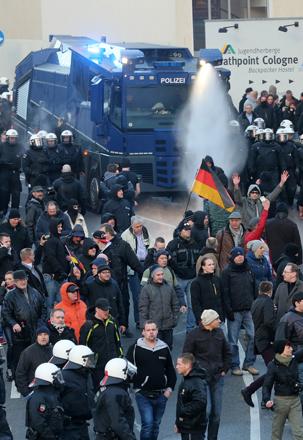You are here
Far-right demands halt to refugee influx after Paris attacks
By AFP - Nov 16,2015 - Last updated at Nov 16,2015

Migrants and refugees arrive on the Greek island of Lesbos after crossing the Aegean Sea from Turkey on Monday (AFP photo)
BERLIN — European populist and far-right leaders Monday seized on the militant attacks in Paris to demand the continent stem the record migrant influx, charging that terrorists could hide among the masses.
France's anti-immigration National Front leader Marine Le Pen called for an "immediate halt" to new migrants, while Germany's Islamophobic PEGIDA movement hoped to draw record numbers to its latest rally Monday evening.
Hungary's hardline Prime Minister Viktor Orban, who has shut out refugees with razor-wire fences, said that "terrorists have exploited mass migration by mingling in the mass of people leaving their homes in the hope of a better life."
"We don't think that everyone is a terrorist, but no one can say how many terrorists have arrived already, how many are coming day by day," he told parliament in Budapest.
From Poland to the Netherlands and as far as the US state of Alabama, politicians charged that extremists could be hiding among the masses fleeing conflict.
They pointed to the discovery of a Syrian passport near the body of one of the Paris suicide attackers, with French prosecutors saying his fingerprints matched those recorded in October in Greece, the main route for Europe's biggest migrant influx since World War II.
President Barack Obama warned against drawing a link between terrorism and refugees, after two US states said they would block or suspend a programme to resettle Syrian refugees within their borders.
"The people who are fleeing Syria are the most harmed by terrorism, they are the most vulnerable," Obama told a news conference in Turkey.
"It is very important that we do not close our hearts to the victims of such violence and somehow start equating the issue of refugees with the issue of terrorism."
'New era started'
In Germany, the year-old PEGIDA protest movement — short for Patriotic Europeans Against the Islamisation of the Occident — was hoping to draw large crowds for their Monday protest in the eastern city of Dresden, having attracted their highest-ever turnout of 25,000 after the January attacks against the Charlie Hebdo magazine in Paris.
Its founder Lutz Bachmann urged followers to protest against "those who come here bring terror to the country", and against the government's welcoming stance that is expected to bring one million asylum-seekers to Germany this year.
In a weekend Facebook posting, Bachmann had even accused Chancellor Angela Merkel of sharing blame for the attacks.
In still traumatised France, far-right leader Le Pen's party said that its "fears and warnings of the possible presence of jihadists among the migrants entering our country" had been borne out.
Dutch anti-immigration politician Geert Wilders took to Twitter to say to the government: "Will you listen at last: close the borders!"
Germany's justice minister, Heiko Maas, also cautioned against drawing a link between refugees and perpetrators of the deadly Paris attacks, warning that Daesh could be trying to exploit the debate over Europe's migrant influx.
"We are aware that the IS [Daesh] is known to leave such false tracks behind to politicise and radicalise the issue over refugees in Europe," he said.
It was not just leaders of fringe protest groups, but also mainstream politicians who linked the attacks with the migrant wave.
Poland's incoming European Affairs Minister Konrad Szymanski said Saturday that Warsaw no longer considered an EU plan to redistribute refugees across Europe to be a "political possibility" in light of the Paris attacks.
In Germany's southern Bavaria state, the main gateway for arriving migrants, Markus Soeder, a leader of the conservative CSU Party, charged that "a new era has started. The time of uncontrolled and illegal immigration is over. Paris has changed everything."
A commentary on news site Spiegel Online said that since Friday's attacks, leaders of Germany's populist right "seem to be blowing their gaskets", and that "the most likely motive is fear".
It said that "it is one of Daesh's goals that Muslims in Europe feel marginalised and stigmatised, to make it more likely they can recruit them one day."
Related Articles
BERLIN — German Chancellor Angela Merkel vowed Monday to "win back trust" of voters angered by her open-door refugee policy after her conser
BERLIN/DRESDEN, Germany — The trial of a neo-Nazi "terrorist" cell accused of plotting a violent political uprising in Germany&nbs
COLOGNE — German riot police broke up far-right protesters in Cologne on Saturday as they marched against Germany’s open-door migration poli


















